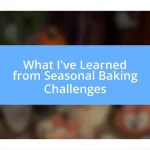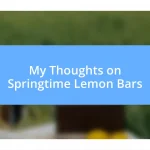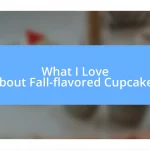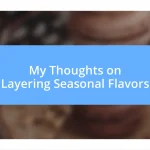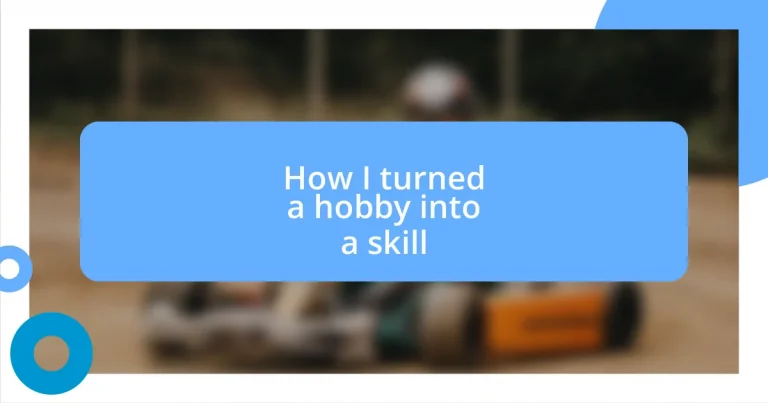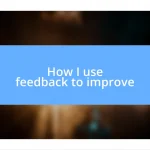Key takeaways:
- Identifying the potential in a hobby involves recognizing what excites you, the skills you develop, and seeking feedback from others to uncover strengths.
- Setting clear, specific skill goals and creating a structured practice schedule enhances motivation and allows for systematic skill development.
- Joining communities and leveraging your skills in public spaces can lead to unexpected opportunities, networking, and personal growth.

Identifying your hobby’s potential
To identify the potential in your hobby, consider what excites you about it. For me, when I first started painting, it wasn’t just the act of putting colors on a canvas; it was the joy of expressing my emotions visually. Have you ever noticed how certain activities make time fly? That’s a strong indicator of a hobby worth exploring further.
As you delve deeper, pay attention to the skills you naturally develop. I remember when I began photography; I initially focused on landscapes, but over time, I honed my eye for capturing candid moments. It felt like uncovering a hidden talent. What aspects of your hobby do you find yourself improving without even trying? That’s a sign of potential waiting to be tapped into.
Don’t shy away from seeking feedback from others—often, they can see strengths that you might overlook. When I shared my artwork with friends, their encouragement opened my eyes to the possibility of showcasing it publicly. It made me wonder: What could happen if you shared your passion with the world? Recognizing these moments can be the first step toward turning a simple hobby into a valuable skill.
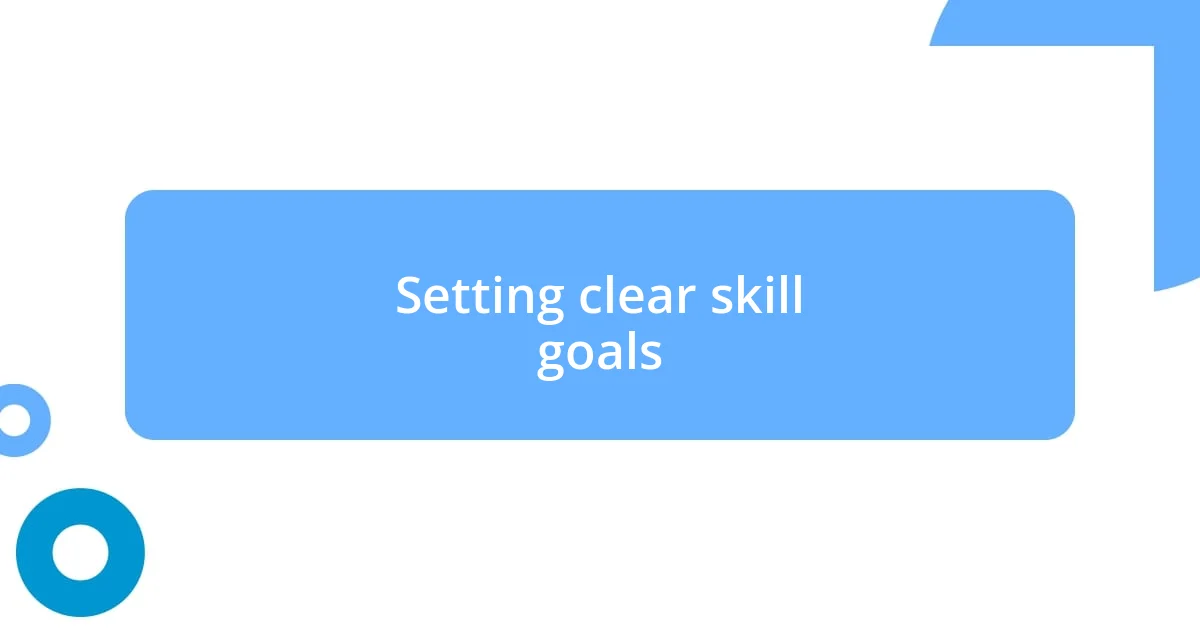
Setting clear skill goals
Setting clear skill goals is crucial in transforming your hobby into a skill. When I decided to improve my guitar playing, I knew I needed specific targets. Instead of saying, “I want to get better at guitar,” I changed that to “I will learn to play five new songs by the end of the month.” This made my journey more interactive and tangible. Isn’t it incredible how focused goals can shift your motivation?
Taking a systematic approach to skill development is also something I embraced. For instance, I began breaking down my guitar practice into smaller segments. One day, I’d focus on mastering chords, while on another, I’d tackle strumming patterns. This not only lessened the overwhelm but brought me a sense of accomplishment each time I checked a goal off my list. What small successes have you celebrated in your hobby journey?
Lastly, regularly revisiting and adjusting your goals is essential. I remember when I initially set my goal to play the guitar well enough for open mic nights. As I gained confidence, I realized I wanted to write and perform my own songs instead. This adaptability became a key part of my growth, reflecting how our passions can evolve. What new goals have you set as you progressed in your hobby?
| Goal-setting Step | Description |
|---|---|
| Define Specific Goals | Clearly articulate what you want to achieve, like learning specific songs or techniques. |
| Break it Down | Segment your skill development into manageable tasks to avoid feeling overwhelmed. |
| Review and Adjust | Regularly reflect on your goals and adapt them as your skills and interests evolve. |
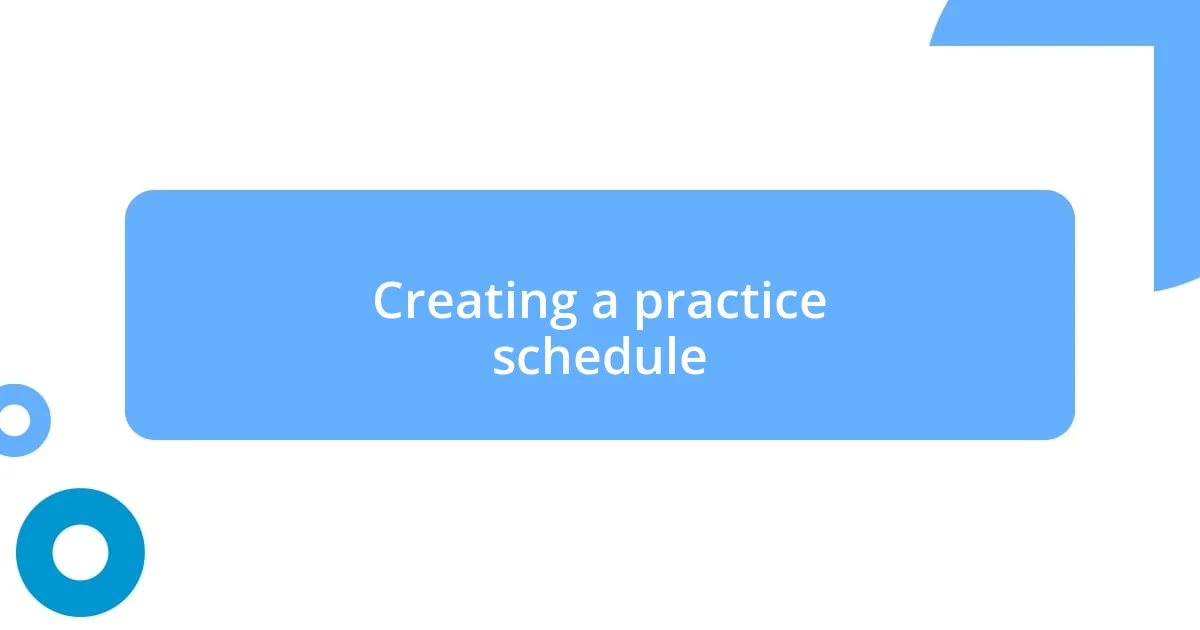
Creating a practice schedule
Creating a practice schedule has been a game-changer for me in honing my skills. Initially, I struggled with consistency, often practicing sporadically. However, once I carved out dedicated time for my painting, everything changed. I remember the excitement of waking up each Saturday morning, ready to immerse myself in colors and canvases. That ritual not only made the practice more enjoyable, but it also built anticipation and a sense of commitment. It made me wonder: what routine could ignite your passion in a similar way?
To make the most of your practice sessions, it helps to structure them thoughtfully. Here’s how I approach it:
- Set Regular Times: Dedicate specific days and times for practice, treating them like appointments you can’t miss.
- Mix It Up: Alternate between different techniques or subjects to keep the sessions fresh and engaging. I often split my time between sketching and painting.
- Track Progress: I maintain a journal where I note what I worked on and my thoughts about each session. This reflection has been invaluable.
- Include Breaks: Give yourself short breaks during longer practice sessions to recharge. I find that stepping back for a few minutes lets my creativity flow more freely upon returning.
- Stay Flexible: Life can get busy. I’ve learned to adjust my schedule when needed, and that adaptability has kept my passion alive.
By setting a practice schedule tailored to your lifestyle, you create a thriving environment for growth. What elements will you include in your own plan?
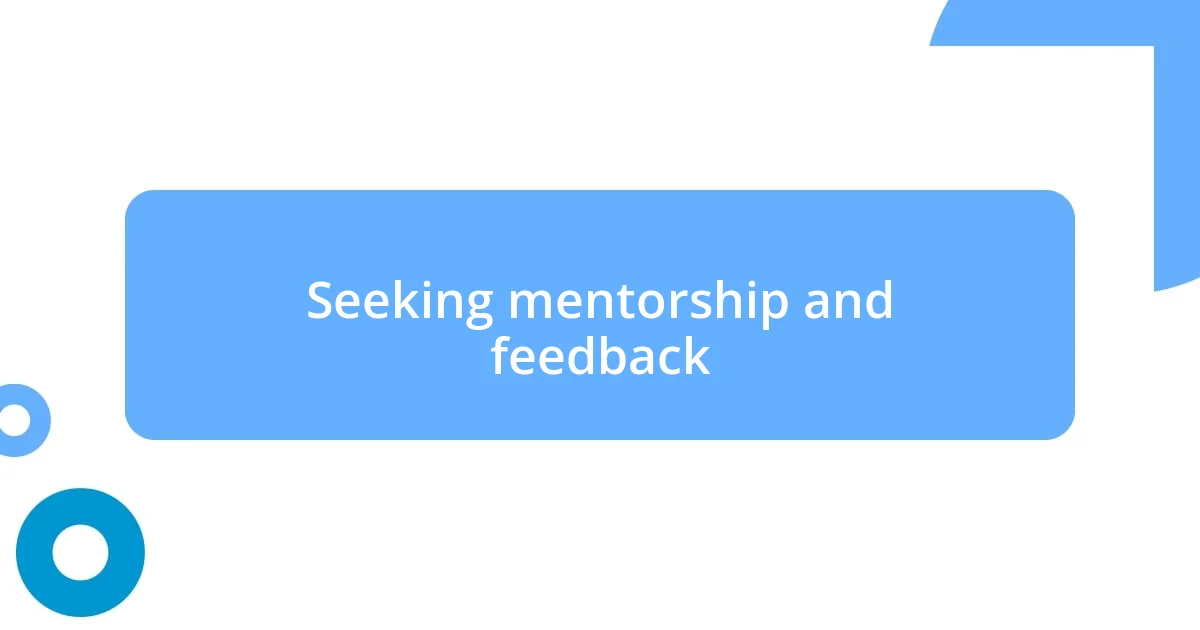
Seeking mentorship and feedback
Seeking mentorship has been one of the most rewarding experiences in my journey. When I first picked up the guitar, I felt lost and uncertain. I vividly recall the moment I reached out to a local band guitarist for guidance. Not only did their feedback sharpen my skills, but their encouragement reassured me that I was on the right path. How many times have you hesitated to seek help, only to find that it could open new doors?
Feedback is another pillar that has propelled my skill development. I remember recording my playing and sharing it with friends who were more experienced. Their constructive criticism made me aware of the little things I could improve—like my timing and tone. The vulnerability of putting my work out there was intimidating, but the insights I gained were invaluable. Have you ever considered how much you could grow by simply asking for another’s perspective?
Finally, surrounding myself with a supportive community has been transformative. Joining a local music group gave me not just mentors but also peers who shared similar passions. Their enthusiasm was contagious, and I found myself feeling inspired after every jam session. I often wonder: how can connecting with like-minded individuals shape your own skill journey? It’s in these collaborative spaces that we often find the encouragement and motivation needed to propel ourselves forward.
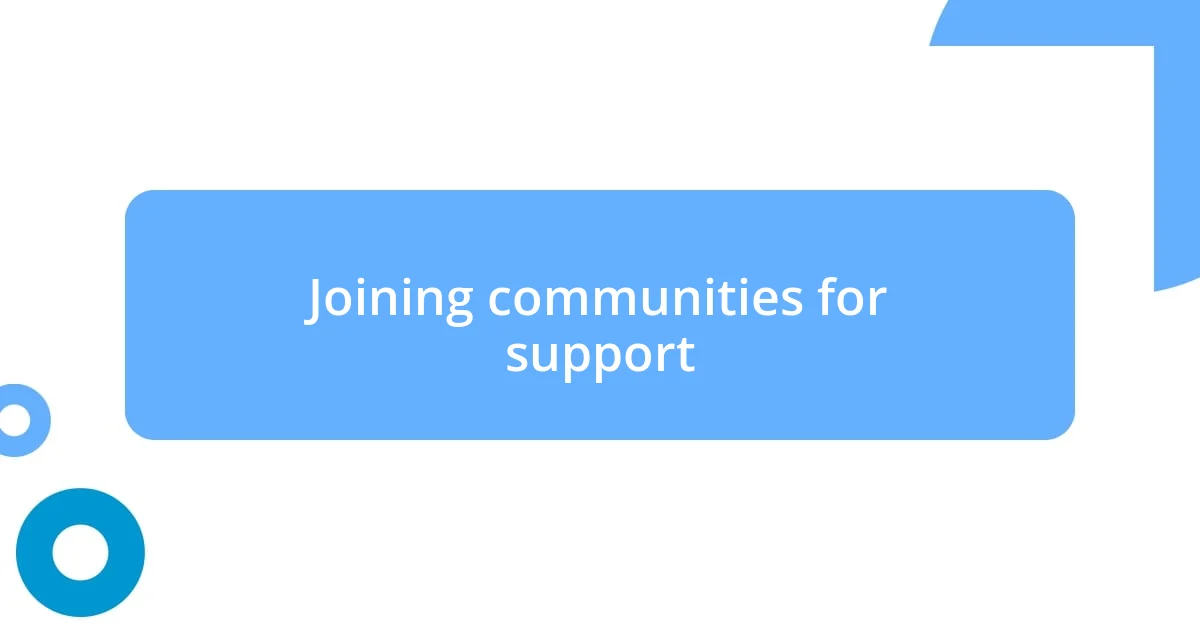
Joining communities for support
Joining communities has been a pivotal step in my skill development journey. I still remember the first online art forum I stumbled upon—it felt like walking into a warm, welcoming room filled with kindred spirits. We shared our work, offered critiques, and celebrated each other’s progress. It made me realize that engaging with others who share the same passion can spark creativity in ways I never anticipated. Have you ever wondered how much more you could flourish just by being around people who truly understand your craft?
In these communities, I discovered resources and opportunities that completely enriched my experience. I recall a local art group organizing a monthly challenge, where members created pieces based on a theme and presented them to each other. That sense of accountability pushed me to explore new styles I might have shied away from solo. When was the last time you stepped outside your comfort zone, only to find a hidden gem of talent within yourself?
Crafting connections within these groups is genuinely rewarding. One time, a fellow artist reached out and suggested we collaborate on a piece. I was thrilled—and honestly a bit nervous! Yet, working alongside someone else opened up a whole new perspective on my own abilities. Collaborating not only expanded my skill set but also deepened my appreciation for the community we built together. Have you considered how much growth awaits when you surround yourself with those who encourage you to aim higher?
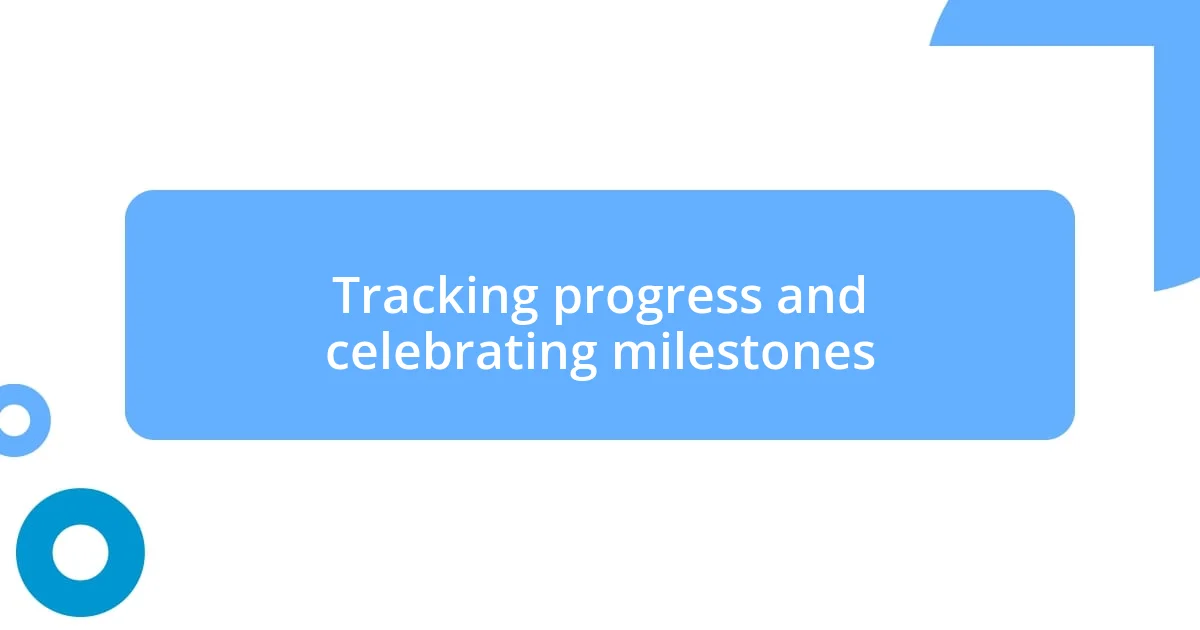
Tracking progress and celebrating milestones
Tracking my progress has been an eye-opening experience. I started a journal dedicated to my skill development, where I would jot down my practice sessions, breakthroughs, and frustrations. There’s something incredibly satisfying about flipping back through the pages and seeing how far I’ve come, both in terms of techniques and confidence. Have you ever taken a moment to reflect on your own journey? You might be surprised at the growth staring back at you.
Celebrating milestones, no matter how small, has become a tradition for me. After I finally nailed that tricky chord progression, I treated myself to a night out with friends. It wasn’t just about the accomplishment; it was about acknowledging the hard work and joy that came with it. Why is it that we often overlook the importance of celebrating our victories? Each small win fuels my motivation for the next challenge, reminding me that every step is part of the bigger journey.
One of my favorite moments was completing my first full song. I remember the mix of pride and disbelief when I played it for my family. Their spontaneous applause made my heart swell and solidified this passion as a meaningful part of my life. It’s fascinating how celebration can enhance our experiences. Have you experienced a moment like this, where sharing your achievement amplified its significance? Those shared celebrations not only deepen our connections with others but also reinforce our commitment to continue growing.
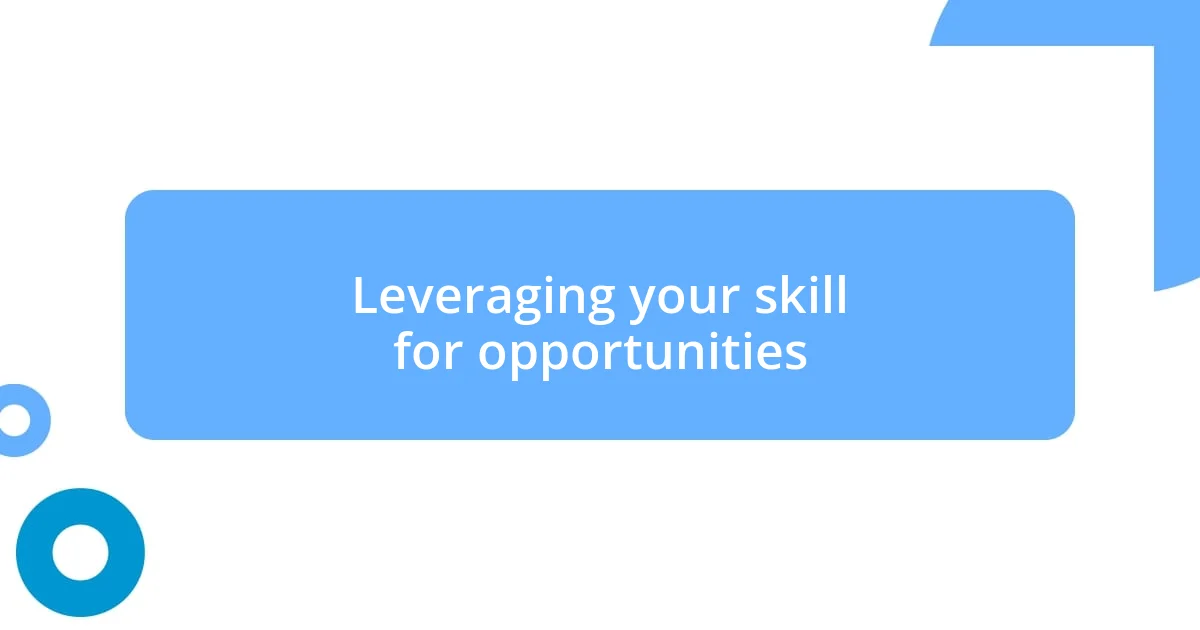
Leveraging your skill for opportunities
When I first started honing my skill, I quickly realized the importance of leveraging it for unique opportunities. I remember attending a local craft fair, where I set up a small booth to showcase my artwork. The thrill of seeing strangers admire my pieces was exhilarating! That experience not only boosted my confidence but also opened the door to commissions and collaborations I never thought possible. Have you ever considered how sharing your work in public spaces could lead to unexpected opportunities?
Networking became my secret weapon. One memorable afternoon, I joined a meetup for creatives, which led to meaningful conversations with fellow enthusiasts. During one chat, I discovered someone was organizing an exhibition and was looking for artists. My heart raced as I shared my work with them, resulting in my first gallery showing. Doesn’t it make you think about the potential connections waiting to be made just by putting yourself out there?
Once I started leveraging my skill, I also embraced social media as a tool for growth. I recall posting progress shots of my art, and to my surprise, an art influencer shared my work with their followers. Overnight, I gained more followers and opportunities than I could have imagined! Isn’t it fascinating how a single post can change the trajectory of your journey? Embracing these platforms not only amplifies your reach but builds a community eager to support your growth.



